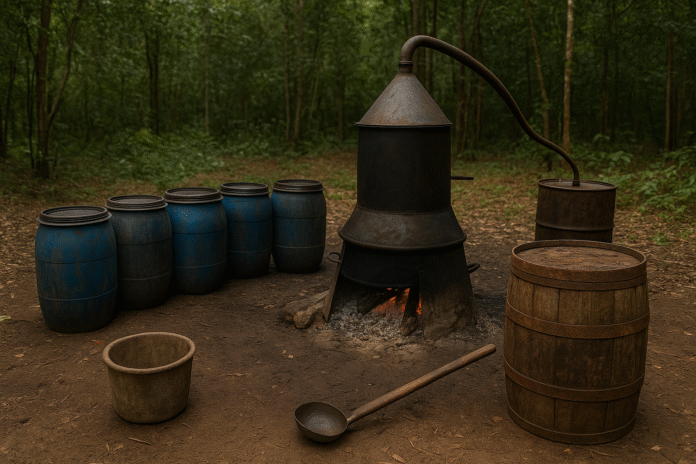In a renewed crackdown on unregulated liquor production in the Andaman & Nicobar Islands, two separate operations in Car Nicobar and Rangat have led to major seizures, exposing the growing scale of illicit brewing in the region. The incidents, occurring within days of each other, reflect a troubling trend of unauthorized alcohol operations taking root in forested and hard-to-reach areas across the islands.
In the first case, law enforcement officials in Car Nicobar acted on a tip-off that illegal liquor was being stored near a residence in Kinyuka Village. A search was conducted across the house, nearby garden, and adjacent forest patch. Officers eventually uncovered a plastic jerrican, capable of holding 5 litres, hidden behind a wild tree. It contained approximately 2 litres of illicit liquor. The resident of the premises admitted to ownership of the liquor and was immediately taken into custody.
Following standard legal protocol, the site was videographed, and liquor samples were collected, 100 ml for chemical analysis and 100 ml as a reserve sample. The remaining quantity was sealed and seized in the presence of witnesses through a formal panchnama at 6:15 p.m. The suspect was arrested under Section 32 of Regulation III of 1876 at 6:30 p.m., and his family was informed. He was later taken to the police station for further legal proceedings.
Meanwhile, in a separate incident in Rangat, authorities carried out a raid in the remote forest region of Ulli Dera, specifically in the Shyamkund area. The action followed sustained surveillance and intelligence gathering, ultimately leading to the discovery of a concealed distillation setup, locally referred to as a bhatti. Officers recovered fermentation barrels, improvised brewing tools, and over 175 litres of ‘Lehan’, a fermented liquid used in country-made liquor production.
The entire stock of Lehan was destroyed on-site to prevent further use, and the makeshift distillation unit was dismantled and cleared from the area. While no arrests were made during the Rangat operation, samples were collected, and investigations are underway to identify those responsible for running the facility.
The two incidents have once again brought into focus the growing presence of illegal liquor networks in the Andaman & Nicobar Islands, particularly in Middle and North Andaman. The combination of dense forest cover, limited enforcement access, and sparse populations has made some regions fertile ground for unauthorized brewing operations.
Such illicit activities evade both regulatory oversight and taxation while posing serious public health risks. The unregulated production and consumption of spurious liquor have been linked to multiple cases of poisoning, long-term organ damage, and even fatalities in other parts of India.
The rising availability of illegal liquor also threatens the social fabric of rural communities. Easy access to cheap, unregulated alcohol contributes to rising addiction, domestic instability, and erosion of community well-being.
With the number of liquor-related cases steadily climbing over the past year, enforcement agencies have intensified monitoring of vulnerable zones. Though geographical challenges persist, recent operations indicate a more assertive approach by authorities.
Residents have been urged to assist enforcement efforts by reporting any suspected brewing or distribution activity. Officials stressed that community vigilance is critical to combating the illicit liquor trade, which continues to expand in scale and sophistication.





